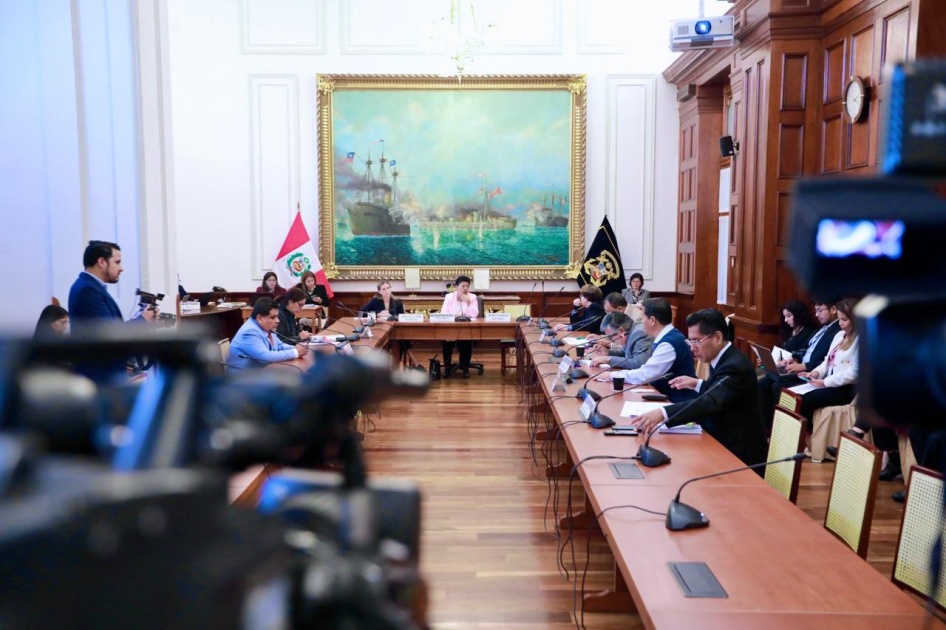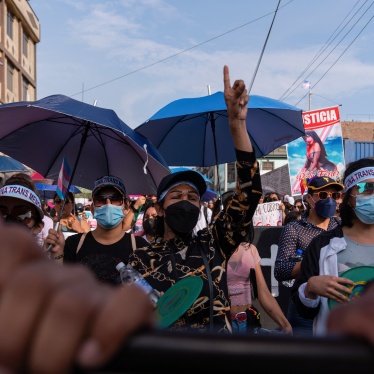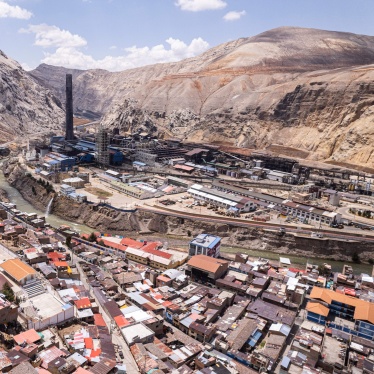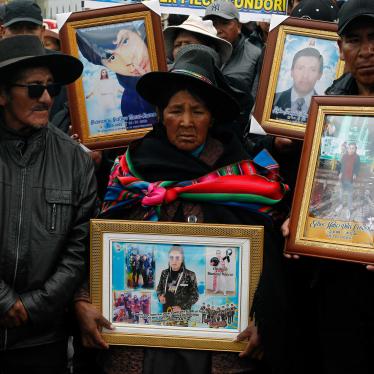(Washington, DC) – Peru’s Congress is accelerating steps that undermine judicial independence, restrict civic space, and hinder investigations into organized crime and human rights violations ahead of the end of the legislative session on June 15, 2024, Human Rights Watch said today. Members of the Organization of American States (OAS) should discuss the situation in Peru during the organization’s general assembly in Paraguay in late June.
During the first week of June, lawmakers moved forward a constitutional amendment that would eliminate key judicial bodies and undermine the independence of electoral authorities. They also advanced bills that would provide the government with overly broad powers to control nongovernmental organizations and undermine investigations into human rights violations committed in the 1980s and 1990s. Under Peruvian law, constitutional amendments need to be approved in two separate congressional periods, with the next one starting on July 27.
“Peruvian legislators are ramping up their actions to control judicial and electoral authorities, weaken accountability systems, and undermine oversight and criticism of their actions with a flurry of destructive legislation suddenly moving forward, ” said Juanita Goebertus, Americas director at Human Rights Watch. “These measures are likely to have serious consequences for all Peruvians, allowing organized crime to thrive and making it harder for people to receive protection when their rights are abused.”
On June 5, Congress’ Constitutional Committee moved forward a constitutional amendment to eliminate the National Board of Justice, the body in charge of appointing and removing judges, prosecutors, and electoral authorities. The change would instead put legislators in charge of appointing and removing electoral authorities, as well as removing the heads of disciplinary bodies for the judiciary and the Attorney General’s Office. If the amendment is approved by Congress this week, and again in the next legislative period, it will severely undermine the independence of judicial authorities and threaten the legitimacy of future elections.
Also on June 5, Congress’ Foreign Relations Committee moved forward a bill that would vastly increase the government’s authority to control nongovernmental organizations that receive foreign funds. The bill uses overbroad and vague language that would, in practice, provide the government with the power to arbitrarily fine or sanction groups that criticize or oppose government actions.
On June 6, Congress approved, on its first reading, a bill with the stated purpose of “clarifying the application and scope of the crime against humanity and war crimes” in Peru. The bill, which needs a second congressional vote to pass, says, contradicting international law, that war crimes and crimes against humanity committed before November 2003 are subject to a statute of limitations. It could be used by judges and prosecutors to undermine ongoing investigations into serious human rights violations committed during Peru’s armed conflict (1980-2000) and could open the door to reviewing convictions against members of the Shining Path, a Maoist armed group, and against security and government officials responsible for war crimes.
This measure undermining accountability for past human rights violations—including crimes against humanity and war crimes—fits within an existing congressional pattern of actions furthering impunity and dismantling the rule of law, Human Rights Watch said.
In recent years, Peru’s Congress, where half of the lawmakers are reportedly under criminal investigation, has moved forward with a range of decisions that undermine judicial independence, weaken the fight against corruption and organized crime, and dismantle democratic processes and human rights protections.
President Dina Boluarte has repeatedly joined forces with Congress, which recently voted down several motions to remove her from office.
In 2023, lawmakers shortened the period for tolling the statute of limitations in criminal cases. The president of Congress, Alejandro Soto, then invoked the new law to seek dismissal of a criminal case pending against him. Lawmakers also made substantial changes to the Efficient Collaboration Law, weakening what had been an essential tool in investigations of organized crime. On May 30, they approved, on first reading, a bill that would narrow the definition of “organized crime,” making it harder to investigate many related offenses, such as extortion, which has skyrocketed in recent years.
Congress used an unfair process to appoint six of the seven Constitutional Tribunal judges; appointed an ombudsperson with no human rights experience; removed a top prosecutor without basis; and removed two members of the National Board of Justice on questionable grounds. Some lawmakers are also seeking to remove the head of the National Elections Tribunal, the highest body in charge of electoral matters.
Among other cases involving members of Congress, prosecutors are investigating an alleged influence-peddling scheme between members of Congress and former attorney general Patricia Benavides, whom the National Board of Justice removed on May 22. Investigators allege that Benavides influenced congressional decisions by closing criminal investigations against lawmakers. Separately, Benavides is also under investigation for allegedly attempting to block an investigation against her sister, a judge, who was accused of unlawfully releasing members of drug cartels.
On June 7, the Inter-American Commission on Human Rights said that the way Peru’s Congress has exercised power could put the rule of law “in critical danger.”
Members of the OAS will meet on June 26-28 in Asunción, Paraguay, for the organization’s general assembly. Since 2001, OAS members have agreed to a shared “obligation to promote and defend” democracy, including the separation of branches of government, respect for fundamental rights, and periodic, free, and fair elections.
OAS members at the general assembly should urgently raise concerns about the dismantling of the rule of law and democratic systems in Peru, Human Rights Watch said. The European Union and other concerned states should also publicly urge President Boluarte to ensure respect for the rule of law and judicial independence.
“Governments in the Americas urgently need to speak up on the democratic backsliding in Peru,” Goebertus said. “It’s in their interest to stop the infiltration and expansion of organized crime and corruption in their neighbor’s institutions—and that’s certainly in the best interest of Peruvians.”









